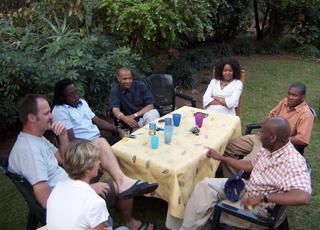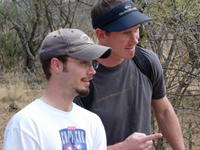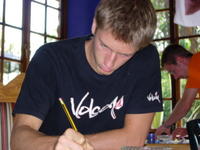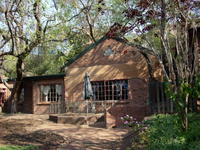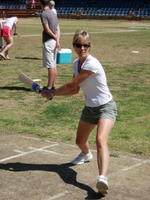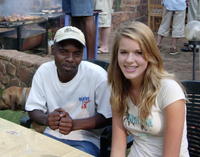A few nights ago Jonathan—our 18-year old—needed to go downtown to catch an all night bus ride out to the coast to work at a youth camp for inner city kids. Jonathan hadn’t driven in the city center yet, and he wanted the practice. (Driving in South Africa is not like driving back home. You drive on the opposite side of the road, the driver sits on the right side of the car, and you have to learn to shift with your left hand instead of your right. All that takes a little getting used to, not to mention learning to drive in a dense urban environment).
Anyway, driving into the inner city of Pretoria at night also has its own unique challenges…the central one being to avoid getting car-jacked. As we were wandering around downtown trying to find the drop off spot, I found myself coaching Jonathan how to drive downtown at night. Just little things, like easing off the accelerator long before you come to a red light so that you never actually come to a stop; rolling through stop signs if you see guys standing anywhere near the intersection; and not getting too close to the car in front of you to avoid getting wedged between 2 cars.
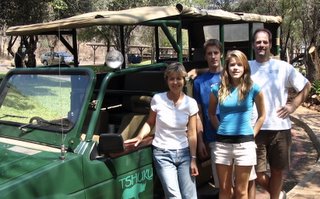
As I got back into the car after Jonathan jumped on the bus, it struck me how interesting it was that our whole conversation about driving in the inner city at night was so nonchalant. It was just so natural, so matter-of-fact. Neither of us thought it was odd or even troubling to be talking about car-jacking and how to reduce the risk. I guess there are some things you just get used to in a place like this…things you adjust to and learn to live with.
But there are other things I don’t know if I will ever get used to…or even if I should get used to them. Last week I was reading an article in the local newspaper about the epidemic levels of rape and abuse in the city. In 1 downtown middle school, 52 girls reported to have been either sexually abused or raped at sometime in their lives. 52 girls in just 1 school! What is going on?! How do you explain that?
Well, there are sociological reasons that attempt to explain it. For example, it is commonly believed in many parts of Africa that having sex with a virgin will cure AIDS, and the younger the girl, the more likely that she will be a virgin. That’s one huge factor. Pervasive substance abuse is another major contributor to abuse.
But I suspect the deeper reason has something to do with the bankruptcy of people’s souls—something old time theologians would have called “depravity.” I find myself wondering if there is some correlation between being deprived and becoming depraved. I wonder if people actually forget what it means to be truly human—human in the sense in which God intended—if they have been treated as less than human for so long. I suspect that when people have been deprived of love for a long time, they actually forget how to love, and then they end up acting with unimaginable cruelty. Maybe that’s what depravity is really all about—forgetting how to love, and maybe that’s really not so odd. Maybe what’s really odd is when we expect people to act so well when they have been loved so poorly.
I’m not sure if there is anything we can do down here that would be more powerful, more transformational, than just loving people well. Loving them selflessly. When Jonathan spends 10 days hanging with inner city kids at camp, he is loving people well. When Laurie sits and talks with teenage girls at a local “place of safety,” a boarding school for kids who have been removed from their parents, she is showing them how to love. When Brittney goes out to a nearby township to spend time with some teenage girls there, something no other white girls that we know of would do, she is showing courageous love.
I’m really proud of my family. They are making their lives count down here in a place that is very different from anything we’ve ever experienced. I’m also proud of Melissa, our 20-year old who is back in San Diego in her 3rd year of college. She is a psychology student, and each week she volunteers at a local elementary school to counsel kids who have been removed from their classrooms because of emotional and behavioral problems. Melissa is also doing her part to change our world…one act of love at a time.
May we learn how to love—really love—and may it become contagious.
 Christmas was different this year. We played Marco Polo in the pool under balmy African skies. We barbecued fish instead of cooking turkey. We spent it with our missions team instead of our extended family. And we went to Burgers Park (Pretoria's central park) to attend a Christmas program and to help serve food and pass out gifts to the poor and homeless. It wasn't your typical Christmas program or our typical Christmas experience.
Christmas was different this year. We played Marco Polo in the pool under balmy African skies. We barbecued fish instead of cooking turkey. We spent it with our missions team instead of our extended family. And we went to Burgers Park (Pretoria's central park) to attend a Christmas program and to help serve food and pass out gifts to the poor and homeless. It wasn't your typical Christmas program or our typical Christmas experience. The program was what you might call "low budget." The singing was somewhat strained as people from multiple cultures were trying to understand what was going on, let alone understanding the words of the songs. The dramas were simple, sometimes corny, and the acting was marginal. The food and gift distribution was somewhat chaotic, but at least everyone got a hot meal and every kid under 12 got 1 gift. But you know what? There was joy. And there was dancing.
The program was what you might call "low budget." The singing was somewhat strained as people from multiple cultures were trying to understand what was going on, let alone understanding the words of the songs. The dramas were simple, sometimes corny, and the acting was marginal. The food and gift distribution was somewhat chaotic, but at least everyone got a hot meal and every kid under 12 got 1 gift. But you know what? There was joy. And there was dancing.
